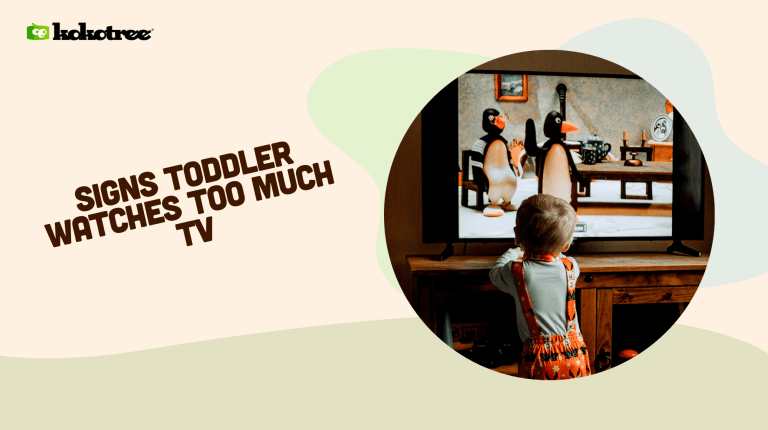

Television offers a mix of educational and entertaining content suitable for all ages. For toddlers, it can introduce them to new ideas, stories, and knowledge. However, too much screen time can come with its setbacks. Recognizing these signs is crucial for parents to ensure their children’s healthy development. Here’s a detailed look into the 13 signs that suggest your toddler might be watching too much TV.
Why it happens: Exposure to violent or aggressive content can influence a child’s behavior. Toddlers, still developing their understanding of the world, might think such behaviors are acceptable.
What to do: Monitor the content they watch and ensure it’s age-appropriate. Encourage discussions about what they see and how it differs from real-life acceptable behavior.
Why it happens: The blue light emitted by screens can interfere with the production of melatonin, a sleep hormone.
What to do: Limit screen time at least an hour before bedtime and create a calming bedtime routine. Consider reading a book instead.
Why it happens: Spending long hours in front of the TV reduces the time available for physical play, crucial for motor skills development.
What to do: Allocate specific TV times and ensure they get ample outdoor playtime. Organize playdates or join a local playgroup.
Why it happens: Interactions with screens don’t replace real-life social interactions needed to develop essential social skills.
What to do: Organize playdates, storytimes, or group activities where they can interact with peers.
Why it happens: Continuous stimulation from rapid scene changes on TV can reduce their ability to focus on slower-paced real-world activities.
What to do: Mix screen time with activities that require concentration, like puzzles or building blocks.
Why it happens: Passive listening doesn’t promote active language development as effectively as conversations and reading.
What to do: Dedicate time to read with them daily and encourage them to express themselves verbally.
Why it happens: Over-familiarity with TV content can overshadow their original creativity during playtime.
What to do: Introduce them to a variety of toys and encourage imaginative play without TV influences.
Why it happens: Over-reliance on TV narratives can limit their imaginative capabilities.
What to do: Engage in art and craft activities, storytelling sessions, and outdoor explorations to spark creativity.
Why it happens: They might become overly dependent on TV for entertainment, leading to meltdowns when denied.
What to do: Gradually reduce TV time, provide alternatives, and be consistent with screen time rules.
Why it happens: Excessive screen time strains eyes, which are still developing in toddlers.
What to do: Ensure breaks after every 30 minutes of screen time and get regular eye check-ups.
Why it happens: TV offers easy entertainment, making other activities seem less appealing.
What to do: Create a balanced routine incorporating a variety of non-screen activities.
Why it happens: TV becomes a coping mechanism for stress or boredom.
What to do: Understand the underlying issues causing discomfort and offer alternative comfort methods, such as cuddling or reading together.
Why it happens: Just like any other activity, excessive TV can become an addiction.
What to do: Limit screen time, provide a structured routine, and consult a pediatrician if signs persist.
By recognizing these signs early, parents can take proactive measures to ensure a balanced and healthy lifestyle for their toddlers. Remember, it’s not just about limiting screen time, but also about ensuring quality and engaging in other formative activities.
Excessive TV watching in toddlers can lead to developmental, behavioral, and health issues. It may cause sleep disturbances due to blue light interference, impaired language development due to passive listening, reduced physical activity leading to muscle underdevelopment, and potential eyesight problems from prolonged screen exposure. Social skills and creativity can also suffer, as toddlers may miss out on peer interactions and imaginative play.
Yes, TV can overstimulate a toddler. The rapid scene changes, flashing lights, and varying sound levels can overwhelm a toddler’s developing sensory system. Overstimulation can lead to irritability, difficulty focusing, and sleep disturbances.
While TV itself doesn’t directly cause bad behavior, inappropriate or aggressive content can influence a toddler’s behavior. Overexposure to such content might lead toddlers to mimic aggressive acts or language they observe. It’s crucial to monitor and ensure age-appropriate viewing for toddlers.
Breaking your toddler’s TV habit involves consistency and introducing alternative activities. Gradually reduce TV time, set clear screen time boundaries, and ensure a structured daily routine. Engage them in outdoor play, arts and crafts, reading, and other interactive activities. It’s essential to lead by example, minimizing your screen time as well.
Many effects of excessive screen time in toddlers can be reversed or mitigated with proactive measures. Reducing screen time, ensuring quality content, and balancing with other formative activities can aid in reversing negative impacts. Prioritizing physical activity, interactive play, and face-to-face interactions can help restore developmental and behavioral balance in toddlers.



